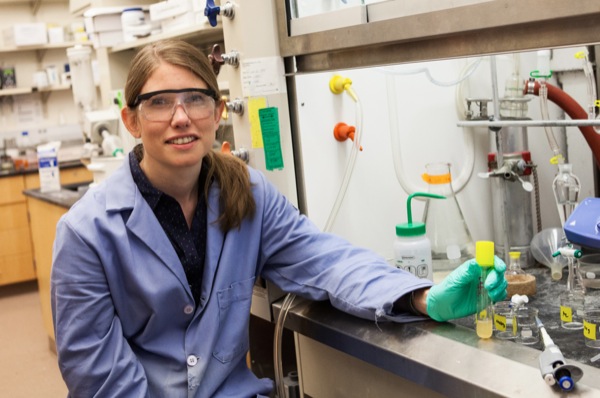
Pew Biomedical Scholar
UD's Catherine Grimes selected for prestigious national award
11:15 a.m., June 24, 2014--Catherine Leimkuhler Grimes, assistant professor of chemistry and biochemistry at the University of Delaware, has been named a Pew Scholar in the Biomedical Sciences by The Pew Charitable Trusts.
Grimes is one of 22 outstanding early-career researchers selected nationwide for the honor this year, and the third consecutive UD researcher to receive the award in the past three years — a record matched only by the University of California, Berkeley, and the University of California, San Francisco.
Research Stories
Chronic wounds
Prof. Heck's legacy
She joins a community of more than 500 Pew scholars whose ranks include multiple recipients of Nobel Prizes, Lasker Awards and MacArthur Fellowships.
“Pew has supported scientific innovation through its scholars program for 29 years. Time and again, this investment has fueled groundbreaking discoveries that hold the promise of better health for millions of people,” said Rebecca W. Rimel, president and CEO of Pew. “We are pleased to welcome the newest class of scholars to a community that continues to yield extraordinary findings in the field of bioscience.”
Launched in 1985, Pew’s scholars program supports top U.S. scientists at the assistant professor level. Grimes will receive $240,000 over the next four years to seed innovation at the start of her independent research career.
Next-generation antibiotics research
“I am so thrilled to receive the award and am grateful to Pew for investing in my research,” Grimes said.
She and her laboratory group are working to better understand how human cells recognize and respond to the presence of bacteria — both commensal bacteria, which normally live in the body, and pathogenic bacteria, which cause disease.
“Did you know that your body is composed mostly of bacteria? They beat us 10 to one,” Grimes says. “For every one human cell, we have 10 bacterial cells.”
Each of these bacterial cells has a cell wall that Grimes compares to a coat. Besides figuring out how this coat is created and what it’s made of, Grimes and her team want to know how the coat starts falling apart in the case of infectious, disease-causing bacteria.
As Grimes explains, during a bacterial infection, fragments of bacterial cell wall are sloughed and then are recognized by the human immune system, which starts to produce anti-inflammatory molecules to attack the bacterial invaders. Currently, however, the identity of these cell wall fragments is unknown. She and her team are busy making proteins that can sense a particular fragment, thereby yielding new targets for developing more effective antibiotics.
Grimes and her team of postdoctoral researchers, graduate and undergraduate students want to “trick” bacteria into incorporating a molecular tag into their cell wall using a powerful combination of methods from cell biology, molecular genetics, carbohydrate chemistry, biochemistry, immunology and microbiology.
The research team’s work could not only help advance antibiotic development, but also could shed light on how “autoimmunity” develops in disorders such as Crohn’s disease and rheumatoid arthritis in which the misidentification of bacterial products is thought to trigger chronic inflammation.
Grimes, who received her bachelor’s degree at Villanova University, her master’s degree at Princeton University and her doctorate at Harvard University, has conducted antibiotic research throughout her academic career. She joined the UD faculty in 2011.
What sets her Pew-funded studies apart is the emphasis on human recognition of bacterial cell wall fragments. It’s an area that she believes is destined to grow.
She points to recent studies that suggest a link between the health of gut bacteria in mothers and healthy brain development in newborns, emerging research on autism and a possible connection to gut bacteria, and yet other studies suggesting that “mismatched microbiota” can mean the difference between a skinny mouse and an obese one.
“This whole world of bacteria — the microbiota — influences the human body,” Grimes says simply. “We have to understand what we’re living with, and know what’s living in us.”
Pew scholar selection
Pew biomedical scholars are selected based on proven creativity by a national advisory committee composed of eminent scientists, including chairman Craig C. Mello, a 1995 Pew scholar and 2006 Nobel laureate in physiology or medicine.
“Scientific breakthroughs often come from seemingly unlikely origins, which is why it’s so important to give young scientists the freedom and the support they need to pursue their most creative ideas,” said Mello. “It is our privilege to help these outstanding investigators pursue new research paths and work with peers across disciplines in order to advance biomedical science and ultimately benefit human health.”
In addition to the scholars program, Pew oversees the Pew Latin American Fellows Program in the Biomedical Sciences, which has provided young Latin American scientists with the opportunity to receive postdoctoral training in the United States since 1991. This year, Pew and the Alexander and Margaret Stewart Trust launched a new national initiative, The Pew-Stewart Scholars for Cancer Research.
Article by Tracey Bryant with material adapted from The Pew Charitable Trusts
Photo by Ambre Alexander Payne








